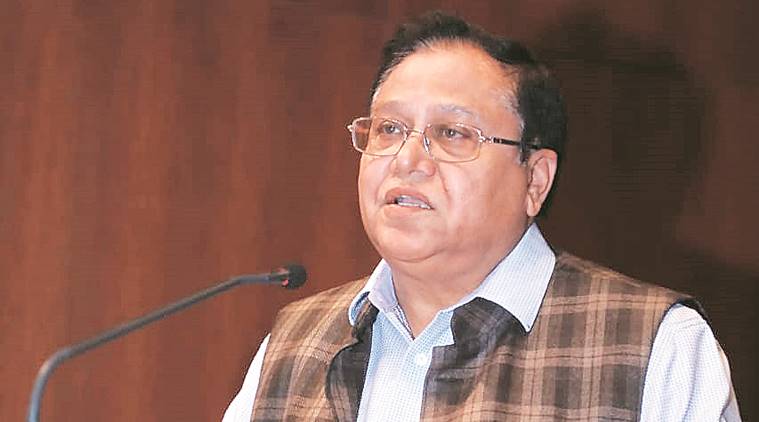Stay updated with the latest - Click here to follow us on Instagram
The country needs manufacturing-based innovation to create wealth: V K Saraswat
Niti Aayog member V K Saraswat Saturday spoke of the need for India to add value to technology that we procure from advanced nations, and not merely replicate it. He also flagged the problem of inadequate government spending on research and development. Saraswat was speaking at the 45th NRDC (National Research Development Corporation) Meritorious Innovation […]
 Niti Aayog member V K Saraswat.
Niti Aayog member V K Saraswat.
Niti Aayog member V K Saraswat Saturday spoke of the need for India to add value to technology that we procure from advanced nations, and not merely replicate it.
He also flagged the problem of inadequate government spending on research and development.
Saraswat was speaking at the 45th NRDC (National Research Development Corporation) Meritorious Innovation Awards Ceremony and Conference on “Connecting Inventors, Innovators, Incubators and Investors for Accelerating the Growth of Start-Ups” at the Entrepreneurship Development Institute of India. “As a country we’re not spending enough on research and development, which is only around 0.8 per cent of GDP, while other countries spend as much as four per cent,” Saraswat said, delivering the presidential address. “I think in our private industries there is no investment on R&D. We’ve not gained much from our international collaborations (with educational or other institutions). We blindly take the technology, do the manufacturing and don’t add value to it.”
To bridge the gap between education and industry, he said, “Every (educational) institution should have a value-addition centre.” We need science entrepreneurs, but scientists in our educational institutions are content simply doing research for the sake of receiving citations in publications, he remarked. “There is no translation (to commercially viable models) of that research,” he said. “However, in the past four to five years, there has been a tremendous push in educational institutions to work on society-based R&D. Translation of research is becoming the order of the day.”
He added: “We’ve to prioritise our R&D.”
Saraswat’s concern was echoed by the state government’s Principal Secretary of Higher Technical Education Anju Sharma. “In our country, we conduct research but most of it lies in the cupboard,” said Sharma. “Application of research to the field is important. The penetration of research work into society is very less. We need to think of ways to change that.”
While most speakers focussed on the importance of opportunity-driven innovation, Sharma had a different take. “Before opportunity, comes sensitivity. One has to have a sensitivity-driven mind to identify the opportunity and thereby (arrive at) opportunity-driven innovation,” she said. “You don’t identify an opportunity without sensitivity.”
Saraswat spoke also of the need to focus on STEM (Science, Technology, Engineering and Mathematics) to lead to quality innovation. “We have to make an economic impact through science and technology and improve our position on the global innovation index, where we are ranked at 57, currently” he said. “Excellence is required in basic research and (we need to) build on applied research. Our country has seen a lot of service sector innovation but the time has come to see engineering-based innovation.”
He said it is engineering-based innovation that would bring value and grow the economy. “Service sector innovation can only lead to distribution of wealth but manufacturing-based innovation will see creation of wealth, making our economy strong.”
Commenting on the changing nature of innovation, which has shifted towards the Internet of Things (IoT) and Artificial Intelligence (AI), Saraswat said, “You’ve to now look at how Artificial Intelligence and data analytics can improve productivity, to be globally competitive for Innovation 4.0. But when we apply disruptive technologies, we’ve to apply it in a balanced manner as it may have an adverse impact.”
Citing an example, he spoke of how a wrong diagnosis by an AI diagnostic device could be dangerous.
“Further, an inequality or concentration of information can create what we call the digital literacy gap. We have major problems today regarding the privacy and secrecy of data. Such factors are going to become part of the innovation cycle.”
Talking about data security, he said, “If you’re going to have an Internet of Things-based network-centric innovation, then one has to take care of cybersecurity and innovate in that domain also to protect communication and data.”
Nine innovators were felicitated with national awards, at the conference, in three categories – National Innovation Award (2), National Societal Innovation Award (3) and National Budding Innovators (4). The awardees also received tax-free cash awards worth Rs five lakh, three lakh and one lakh rupees in the three categories respectively.







